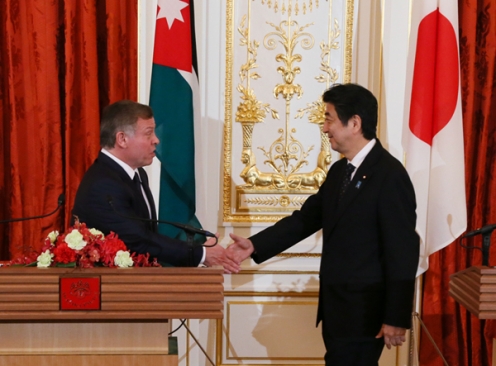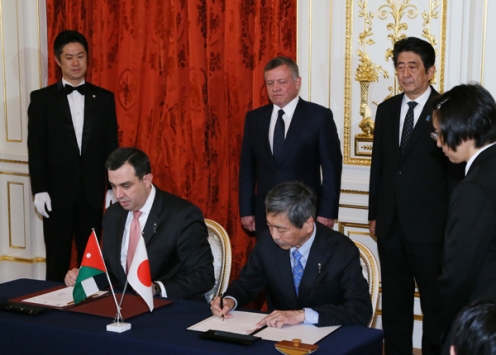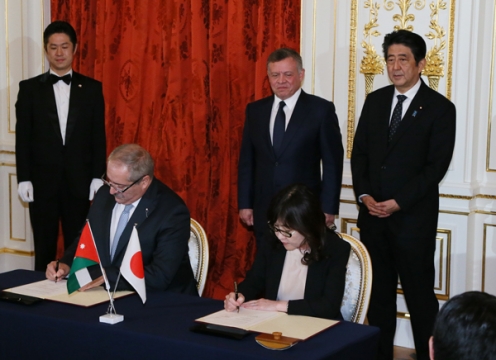Ministry of Foreign Affairs [Wednesday, Nov 2, 2016]
Provision of Yen Loan to Myanmar
1. In the meeting between Mr. Shinzo Abe, Prime Minister of Japan, and H.E. Ms. Aung San Suu Kyi, State Counsellor of Myanmar, held in Tokyo, Prime Minister Abe pledged the provision of a yen loan for the “Hydropower Plants Rehabilitation Project” (loan provision up to 10.787 billion yen). The Governments of Japan and Myanmar plan to sign an exchange of notes related to the yen loan in the future.
2. Overview of the target plan “Hydropower Plants Rehabilitation Project”
The plan calls for renovations to outdated power generation equipment and other facilities at the Baluchaung No.1 Hydroelectric Plant and the Sedawgyi Hydroelectric Plant. This plan aims to stabilize electricity supply in Myanmar and thereby promote economic and societal development and improve the livelihoods of the people of Myanmar.
3. Terms of the loan provision
(1) Interest rate : 0.01% per annum
(2) Redemption period : 40 years (including a 10-year deferral period)
(3) Funding conditions : General untied

Ministry of Foreign Affairs [Friday, Nov 4, 2016]
Exchange of Notes on an Agreement to Dispatch Japan Overseas Cooperation Volunteers to Myanmar
On November 2, an exchange of notes on an agreement to dispatch Japan Overseas Cooperation Volunteers (JOCV) was signed in Tokyo between Mr. Tateshi Higuchi, Ambassador Extraordinary and Plenipotentiary of Japan to the Republic of the Union of Myanmar, and H.E. Mr. Kyaw Win, Union Minister for Planning and Finance of the Republic of the Union of Myanmar, under the high presence of The Hon. Mr. Shinzo Abe, Prime Minister of Japan, and H.E. Ms. Aung San Suu Kyi, State Counsellor of the Republic of the Union of Myanmar.
This agreement provides the basic framework for the dispatch of JOCV to Myanmar. As a result of this agreement, it is expected that the JOCV dispatched by Japan to Myanmar will be able to actively contribute to the economic and social development of Myanmar in various fields.
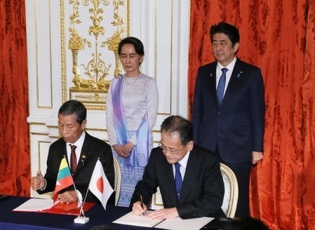
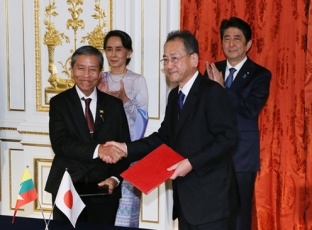
Japan International Cooperation Agency [Friday, Nov 4, 2016]
Signing of Japanese ODA Loan Agreement with Egypt: Contributing to economic development through infrastructure development support in the power and tourism sectors
On October 24, the Japan International Cooperation Agency (JICA) signed loan agreements with the Arab Republic of Egypt in Cairo, the capital city, to provide Japanese ODA loans of up to a total of 90.507 billion yen for two projects.
Since the Egyptian political turmoil of 2011, there has been stagnation in the major industries of tourism and manufacturing and overseas investment has dropped, adversely affecting the economy. Public and private investment has increased as a result of developments, such as economic and fiscal reforms, advanced by the current administration that was inaugurated in June 2014, and the economic growth rate, which had been hovering at around two percent since the political turmoil, recovered to 4.2 percent in fiscal 2014/15,* and is expected to remain between three and five percent going forward. Economic factors such as rising prices for goods and a high unemployment rate among the youth that were behind the political turmoil remain challenges today, and JICA is providing support toward achieving comprehensive, sustainable growth in Egypt.
* The Egyptian fiscal year is from July 1 of one year to June 30 of the next. Fiscal year 2014/15 refers to the period from July 2014 to June 2015.
The features of the Japanese ODA loans are outlined below.
(1) Supporting a more efficient and reliable power supply
The maximum power demand in Egypt has grown at an average annual rate of six percent since 2004, which is higher than the average annual economic growth rate of 4.4 percent, and at this rate the maximum power demand will outstrip the current supply capacity by fiscal year 2017/18. In order to provide a stable supply of power that meets the strong demand, the plant efficiency of the existing power plants must be maintained and improved, and the power production capacity further increased.
The Electricity Sector Rehabilitation and Improvement Project will update and rehabilitate the equipment at existing thermal power stations under the jurisdictions of the Cairo Electricity Production Company, the Middle Delta Electricity Production Company and the West Delta Electricity Production Company and provide the companies with spare parts. Doing so will restore the production capacity of those power stations which have lost efficiency due to degradation while improving plant efficiency to provide a stable supply of power. By improving the power plant efficiency, it is expected that this project will also reduce the emissions of greenhouse gases, alleviating climate change.
(2) Supporting sustainable economic growth by promoting tourism
Blessed with a wealth of cultural properties, Egypt once welcomed 14 million tourists from around the world each year, but that number has declined in the wake of the deteriorating security situation after the 2011 and 2013 political turmoil, dropping to 9.3 million visitors in 2015.
Even so, the tourism sector maintains its place as an important industry for the country, accounting for 11 percent of Egypt’s gross domestic product and 12 percent of employment in 2015.
The Grand Egyptian Museum Construction Project will construct a new museum to strengthen the capacity to preserve and restore historical cultural properties, as well as boosting other functions such as the exhibition and research of such properties and educational activities. It is expected that the construction of the Grand Egyptian Museum will develop the tourism industry and create employment opportunities, thereby contributing to socioeconomic development in Egypt. A Japanese ODA Loan (signed in May 2006 for 34.838 billion yen) was provided for Phase I of this project, and this loan is for Phase II.
Ministry of Foreign Affairs of Japan [Thursday, Oct 27, 2016]
Signing and Exchange of Notes concerning Grant Aid to Jordan
1. On Thursday, October 27, after a Japan-Jordan Summit Meeting, Mr. Shuichi Sakurai, Japanese Ambassador to Jordan, and the Hon. Imad Najib Fakhoury, Minister of Planning and International Cooperation of the Hashemite Kingdom of Jordan, signed and exchanged notes concerning 1 billion yen in grant aid to Jordan (for an economic and social development program) in the presence of the Japanese and Jordanian leaders.
2. The grant aid will be used for providing Jordan with security equipment produced in Japan. The aid is expected to contribute to Jordan’s economic and social development by improving security performance in Jordan to stabilize the country and Japanese companies’ overseas expansion.
3. Surrounded by countries and regions plagued with unstable security, Jordan has positioned border checkpoints and airports as important facilities for security, enhancing inspection and surveillance. Since this year, however, terrorist attacks have occurred. Terrorists are feared to flow into Jordan along with Syrian refugees. Through the grant aid, Japan will contribute to enhancing security in Jordan.
4. At the Group of Seven Ise-Shima Summit in May 2016 (http://www.mofa.go.jp/ecm/ec/page24e_000148.html), Japan offered inclusive assistance towards the stability of the Middle East region (PDF: http://www.mofa.go.jp/files/000158507.pdf). The grand aid is part of Japan’s initiative to build a tolerant and stable society in the Middle East.
